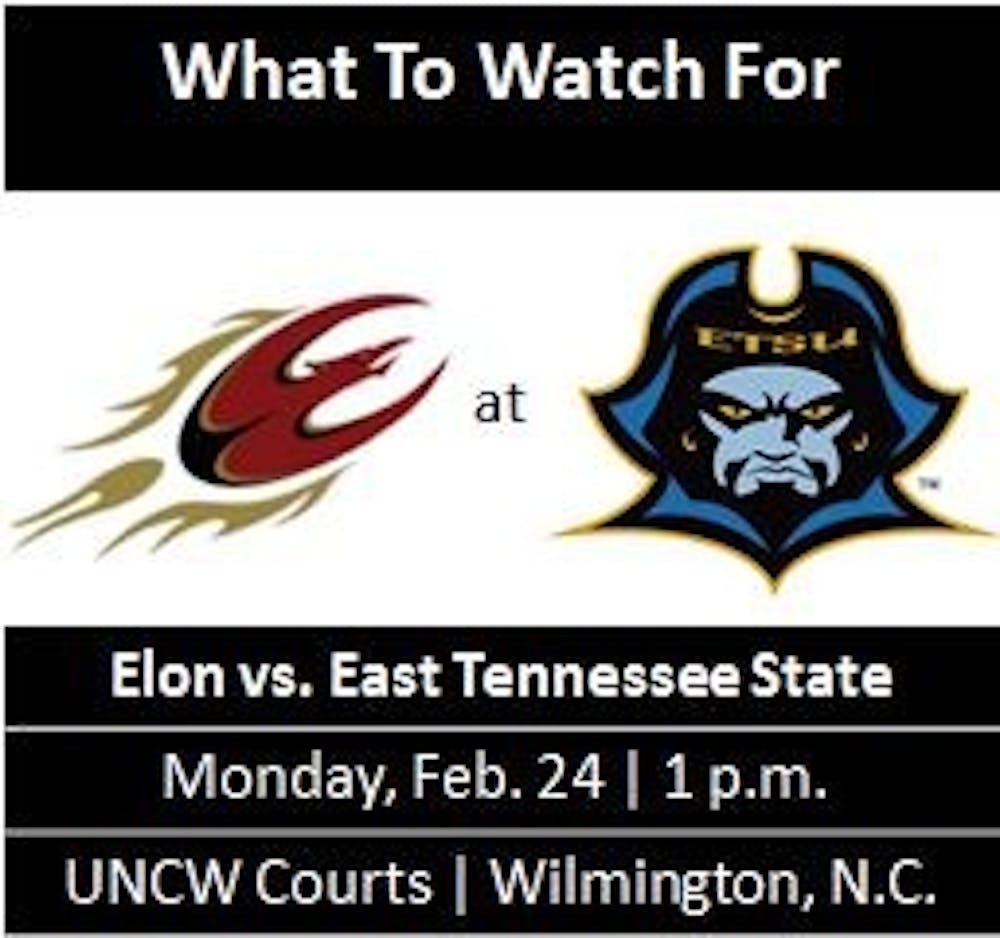Even though the Elon University men’s tennis team is coming off a Southern Conference regular season championship in 2013, the team had something new to adjust to at the start of this year — a new scoring system.
The NCAA and Intercollegiate Tennis Association (ITA) decided both men’s and women’s teams would play an early portion of their schedules under a new experimental scoring system in an attempt to shorten the matches. Although the coaches could agree to not play under the new rules on a match-by-match basis, Elon coaches went through with the changes only to dislike what they saw.
“It’s too much, too drastic,” said Elon director of tennis and head men’s tennis coach Michael Leonard. “You want part of tennis to be physical and [have] endurance.”
With the new rules, singles matches are now played in a first-to-ten super tiebreaker instead of a best-of-three sets format.
“I wouldn’t want to play a super tiebreaker in the third because it takes away part of what the sport is, and that is who’s in better shape,” Leonard said. “If you’re not playing a third set, you’re not determining that at all.”
Not only was an entire set taken away from singles matches, but the new rules also state a tiebreaker would be played at 5-all instead of 6-all. Also, advantage scoring was removed, meaning that after deuce (40-all), the next point would win. Under traditional scoring rules, a player must win two consecutive points to win the game if the score is deuce.
“You don’t have enough time to get into matches,” said Elon junior Brian Kowalski. “You can’t really start off slow anymore. You always have to be mentally ready because anything can happen on any point now.”
Doubles matches have also been shortened. Under the previous scoring system, doubles matches were an eight-game pro set, but the new rules shortened the match to a single six-game set.
“That’s definitely the toughest part,” said Elon senior Cameron Silverman. “Especially [when] you come out in doubles, and it’s only six games as opposed to eight games. Now, coming out flat is even more detrimental than how it was the old way because you don’t have enough time to make up ground.”
In a further attempt to shorten the matches, the break between the doubles and singles portion of the match has been shortened to just five minutes. Opponents are also unable to warm up together before their singles matches.
“You have to stay loose, stay warm, stay focused,” Silverman said. “It’s all something to get used to.”
 With average matches lasting around four hours, the NCAA said shortening the matches would make the sport more friendly toward players, fans and media. But match length didn’t seem to be a major concern for the players.
With average matches lasting around four hours, the NCAA said shortening the matches would make the sport more friendly toward players, fans and media. But match length didn’t seem to be a major concern for the players.
“Most tennis players don’t really think about it because that’s what we’re used to,” Kowalski said. “[But] there are people, myself included, whose bodies break down, because we’ve played so much.”
The NCAA is working toward giving college tennis more fan and media attention by shortening matches. But these claims have given way to a variety of responses. Kowalski said shortened matches will make it “more interesting and more intense for spectators,” but he is unsure if popularity would increase.
Silverman sympathized with the fans, acknowledging that at times long matches can be overwhelming.
“I think in order for college to really kick it up a notch, the times need to be a little shorter,” he said. “I do feel like the crowd comes and goes. It’s just a little too much time to be out there.”
Leonard said the push for more fans and media attention is somewhat unnecessary.
“College tennis is a great fan sport,” Leonard said. “If you get in a real good dual match and have a lot of people there, they’ll tell you they had a great time because it can get real intense. But it’s not a TV sport. [The NCAA] needs to let that go and focus on making tennis the best sport it can be.”
With the shortened matches, top players are no longer playing the long matches that are staples at the professional level. Leonard said he worries if elite players feel they will not be adequately prepared for the pros, they will skip college altogether.
“I think there needs to be a compromise in between where it was and where it is now in which we shorten it a little bit, but keep the integrity of the sport everywhere else,” Leonard said. “If not, you’re going to lose some of the top players who are debating [between] college and going pro, which hurts the sport.”
With the experiment over for Elon tennis and the old scoring reinstated for the rest of the year, it is still too early to judge the next step. With data being gathered from programs all over the country, the NCAA and ITA will look to see if any more changes need to be made.
“It’s not an easy fix, but I think they went just a little too far,” Leonard said.
For the players, it was something they inevitably became used to.
“I’m still not a huge fan of the rule changes, but I understand the reasoning behind them, so I’m starting to get used to them a little bit more,” Silverman said. “Definitely in the last couple of matches, I’ve started to just accept it’s going to happen, and there’s nothing I can do about it.”
Some, like Kowalski, even praised the changes.
“Now that I’ve actually played, I actually like the rules and I think they’re beneficial,” he said.


